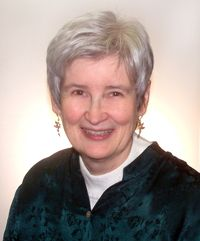Grey Skies and Soft Rain – Interview With Storyteller Mary Gavan
Mary Gavan is a Scottish-born professional storyteller and former palliative care nurse who has been living in Canada for almost 40 years. She is a past President of Storytellers of Canada, and her Celtic Otherworld Stories CD won the 2011 Storytelling World Award.

Ana-Maria Gheorghiu: Mrs. Gavan, I have met writers, but I have never met anyone who described themselves as a professional storyteller. What does that entail?
Mary Gavan: Being a professional storyteller means you work according to a certain standard of storytelling that can meet public demand for entertainment and you do it on a paid commission. Myself, I write my own material, which involves a lot of research; once I’ve done the research it takes me 25 hours to craft it to my own voice and my way of being, so that I tell it sincerely, from my guts. But finding that voice can take even up to two years; I have lots of stuff shoved under my bed because I still haven’t found the voice for it.
I thought I was slow, but then I went to a lecture by the top speech writer in Vancouver and found out that he takes 20 hours to craft a 20-minute speech, so I’m in the right ballpark.
A.M.G.: You had a career in Nursing; that is a big investment. You don’t often hear of people getting out of medical professions, because of how much time and effort they had to put in. What made you choose storytelling as a full-time career?
Mary Gavan: It wasn’t my intention, but it kind of pulled me. For years, I did it as a volunteer. I was working a lot of night shifts, so I got a lot of stuff packed in there and I had the chance to practice language and ways of saying things. It just evolved, it wasn’t a conscious decision. After a while, I dropped to part-time work so I could do both activities.
A.M.G.: As you know, this project collects life stories of East Vancouver seniors. They are not professional storytellers. Still, one of them said that “after 60, anyone can write a bestseller.” How would you comment on that?
Mary Gavan: While you definitely gather enough life experience for that, telling your life story is a very different thing. Recounting is a monologue, and some people are born raconteurs, but it only works when they have the floor. You can be thoroughly entertained, and it’s great (many plays are like that), but it’s not storytelling. A storyteller crafts the material in such a way that it becomes a dialogue, a gift to the audience, opening it up so that they can have their own unique experiences with it. That is where the magic lies. I remember someone came to me once and said: ‘I like the bells in your story’; there were no bells in that story, there was no noise at all, but they had taken the story and made it uniquely theirs and embellished it and believed it. And people get out of the story what they need at that moment.
I think storytellers do the same thing in a way: we tell the stories because somewhere inside of us we need to sort something out. It’s interesting to see how people cope, especially against the odds.
A.M.G.: Does that apply to you as well? Have you ever tried to tell your story?
Mary Gavan: Oh, no, because I’ve led a charmed life. I was educated, I had good jobs and, in some ways, I had quite a settled and sedate life.
A.M.G.: But you came here all alone…
Mary Gavan: That’s because I was nosy. I was doing it because I wanted to. True, it is hard when you are an immigrant, even though it’s your passion to be here.
A.M.G.: So you think a charmed life is not worth telling, especially since it’s so unusual nowadays? Does it always have to include a big challenge to overcome?
Mary Gavan: I think it’s pretty boring, because I feel I had the odds in my favour. When I look at other people’s lives, I think “That is something amazing, that they survived against the odds,” and I like to tell their story to give them credit and let other people know they can survive as well.
A.M.G.: Do you think that sharing stories helps in building a community and reducing isolation? It’s not unusual here for people to live for years in the same place and not know their neighbours; many seniors don’t have their children and grandchildren close to them, which is probably common in many developed countries.
Mary Gavan: In Canada, people move an average of seven times, so you’re always moving away from family. Rarely does the extended family move en masse, so you end up in odd places, away from everyone. You have a duty to take care of yourself and find the organizations and groups that will help soothe your soul. But sometimes (and research shows this), seniors can thrive by being contrary and being alone; that gives them the grit, the backbone to keep going.
Part of getting older is looking back and asking yourself: What did that mean? Was it worth it? And should I continue? What gets me out of bed in the morning? They have a full mental workload to deal with, without the comforting routine of work that keeps you busy and distracted. And the ways they answer those deep philosophical questions are fascinating.
A.M.G.: How do you make someone open up? Some people say: “I have nothing interesting to tell,” and you know that’s not true, you know they have a good story, but it’s hard to get them to talk.
Mary Gavan: It can be very hard to make seniors open up and share their past, because only they know the emotion behind it, and it takes effort to get it out of them. They challenge you to answer some very tough questions: Are you just extracting it from them so you can complete a project, or are you really going to cherish what was unique for them? So my answer as a storyteller is: “I’ll make it into a story so it will be saved for all time.” And I think they’re right to make you work hard to get it on the table. Why should they just give it away when it was a hard-earned life? It’s more of a tango with seniors: They give a bit, you give a bit, whereas children will pore it all out for you.
A.M.G.: You left behind your friends and family almost 40 years ago. Did you make a lot of friends here?
Mary Gavan: No. I’m an introvert, so I have just a few friends and I’m well content with that. I like being in crowds because no one notices me. I belong to different groups, and I have to watch where I put my energies, otherwise it’s draining. I need to feel like I’m involved in the community; I like being politically aware, but I don’t need to have large number of friends. Which is good, because I’ve moved around a lot.
A.M.G.: Were your parents still living when you left?
Mary Gavan: Yes, and, when they were sickly, I ended up traveling back and forth every six months to spend time with them. In retrospect, I should have just moved back to Scotland. But I liked being abroad. Nobody knows my family here, which was very refreshing for me, and I was pushed to do different things. There’s no one about whom I can say “Oh, well, they will do better than I could.” In Scotland, I would have said “Oh look, they’re so much better than I am, let them do it!’ But here I pushed myself to achieve more, to be more creative, outgoing and forward-thinking than I ever would at home. There, I would be in the back row, very content, cheering everyone else. So I had to come out of that little shell.
A.M.G.: So you found that the familiar didn’t give you the chance to shine and grow the way you did when transplanted to a new place?
Mary Gavan: Absolutely. The familiar just gave me a chance to curl up with a hot water bottle. I would have had a very solid, contented life. Alas, I wanted more. That was my quest, to find out how much more I could do. Back home, I would have never been the Head of the National Storytellers Society; I would have said “Oh, my goodness me, now who do you think you are?” But here I’m inclined to say: “Let’s give it a whirl!”
I go back home whenever I feel the need to see my friends and walk the land, to have that ease of being. Even though ‘back home’ changes, because I don’t go back as often as I used to, so each time I visit it’s not the place I left. And I would like to find the place I left.
A.M.G.: Like the teenagers who go to college but still want their room kept exactly the same.
Mary Gavan: Yes. Even if your mouth is applauding the advances, you would just like to see some things that stay put and that make you feel like you really belong there. Because I think you really belong where you spent your formative years; it’s what determines that deep sense of belonging. You can acquire a comfortable sense of belonging as an immigrant, but you’re never absolutely there.
A.M.G.: Why Canada? Why not other countries in Europe? Because you wanted to start something that was new, without so much tradition?
Mary Gavan: Europe was like rolling out of bed; I don’t count it as abroad, it’s like an extended home. I wanted to go abroad. I applied to many places, I filled out seven application forms, and Canada came up. So I thought “Well, this is fate,” and I just came without knowing anything about it. I ended up in the Prairies and I freaked out: I had never seen such space in my life. It was totally alien. I moved to a big city quickly.
I lived in Toronto and adored it. I had a perfect job, perfect friends, it was absolutely 100% right… except—can you believe this?—I needed the grey skies and soft rain. That sky, it’s so magical, you can see things in it. When I lived in Alberta, it was all bloody blue skies, every day of the year, even in winter. Who wants that? No, I needed the grey skies and soft rain. And Vancouver’s got it. At some point, you have to be true to your soul, and I needed that. So I gave up a very good job and came here without employment, but then I found work after a few months.
A.M.G.: How did you find East Van when you got here?
Mary Gavan: I started off in East Van. I lived on Commercial Drive. It was a great place; people left you alone because it hadn’t been discovered yet. It was just itself without pretensions. There wasn’t so much traffic, and it was full of real characters who would just tell you off if you got in their way—it reminded me a lot of home.
That was before gentrification. There was an ethos here in the area that was busted. I remember when I lived in London, England, for a while and the Government turfed out the dockyard areas: families who had lived there for over a thousand years, and the Government ripped up the community. It’s a humongous loss, enough to drive you to drink. It’s one thing to say “I’m leaving and I’m going to something better,” and it’s another thing to have your community ripped apart. You’re cast aside for something that looks very nice—it’s lovely, there’s no question about it, gentrification is gorgeous to look at— but these people were scattered. They didn’t even keep them together as a community. And all their language, all the words that had been built around the wharfs, and the life near the water—gone… So when you put them out in the fresh air, in the suburbs, they’ve got the wrong language, they don’t have the words, and so people die. It’s one way you can kill people off; they literally die of a broken heart.
I must have felt that when I left Toronto, the need for those intangibles. My life runs on intangibles. I think that, if I had been a tangible person, I could have stayed in Scotland. My sister wanted tangible things, like a house in a particular area, so she is able to acquire the things she needs to keep her soul happy.
When making a story, this is something really hard to convey—how do I convey to someone else that every fiber of my being needs to have grey skies and soft rain? I can justify it, I can explain it, but how do I translate it so that someone else can relate? Or, another example, wherever I live, I have to have trees. When I rent a house, I’m actually renting the trees outside.
A.M.G.: I wonder what is preferable: to readily feel that sense of belonging and manage to build something where you are, or to go on a personal quest and explore, like you did?
Mary Gavan: All the stories about quests… People don’t go on quests; they’re dragged through the hedge backwards. In all the really old stories, it’s not the hero going “A-ha! Today’s the day I shall sunder forth, Sire, and I shall conquer!”—no, it’s “There’s a job, and we need someone to do it.” The hero is always dragged into it, and they fail, they keep failing, which is very comforting, especially for an immigrant, because there are many times you don’t succeed. It’s always on the third attempt, and you need helpers and mentors.
A.M.G.: You’ve just mentioned community, the community ripped apart by the government and by different economic situations. But a community would never exist without the people who stayed, the people who never left their tower, or maybe left for a bit and then came back.
Mary Gavan: That’s right. When I go home, I stay with my friend who’s been in the same house for 45 years, unreal as it sounds, and she puts supper on the table every night at 5:17pm precisely. It’s like the light coming on, it’s so reliable. And I need to stay with them because I love the routine and dependability. We need each other. She adores hearing about what I do in my mobility, and I adore her stability.
I have another friend who, when I go back, gets so upset that I’m going to leave that she will see me once and no more. She actually starts what is called anticipatory grieving. I wish she didn’t start it so early, but I like it when people are going to miss me; it’s like having your own wake!
A.M.G.: You said you take 25 hours to craft a story, but it must have happened at least once in your career to have to work against the clock.
Mary Gavan: No. It’s my soul on the line, and you won’t push it around. I don’t do it off the top of my head, I don’t do it off the cuff. I’m an introvert. I’ll practice and, when I’m ready, I’ll tell it. If I’m not ready, I won’t do it.
A.M.G.: It’s never happened even by accident, in a moment of inspiration?
Mary Gavan: It only happened spontaneously when I was working with people, but that’s a very, very, special bond. I worked with people dying, and I was always amazed at what came out of me. But it’s a very cocooned time: it’s just the two of you, and all you’ve got is your humanity. Out of that relationship would come a story, and we would walk down the line to get there. But the stories I would tell then were a reflection of the relationship. Without that bond, I can’t simply tell a story just to pass the next seven minutes.
A.M.G.: You are a very soft speaker. Do you ever find it hard to keep the attention of the audience when they need to be quiet and listen?
Mary Gavan: Not at all. My stories are damn good; the audience is hooked in the first 30 seconds. One of the biggest compliments I’ve had was during a spoken word festival in the park, and someone was passing by as I was a third into the story. As they were passing by, they caught some words and just stood still. At the end, they came to me yelling: “I’m going to be late because of you! I couldn’t move because I had to hear the end of that damn story of yours!”
A.M.G.: That means you could even save your life with your stories, like Scheherazade. It’s an amazing gift.
Mary Gavan: For myself, the gift I really wanted was to be an opera singer. I wanted to sing lustily and bustily, center-stage, and die of consumption in 25 minutes, and then go off, just go out for a pint! That would have been fabulous, my dream life! I don’t have the life that I wanted, but I’ve got the gift of storytelling, and I have to share it. It would be nice to get paid a bit more for it, because we often end up doing it for free, but, first and foremost, I have to share it.





Leave a Reply